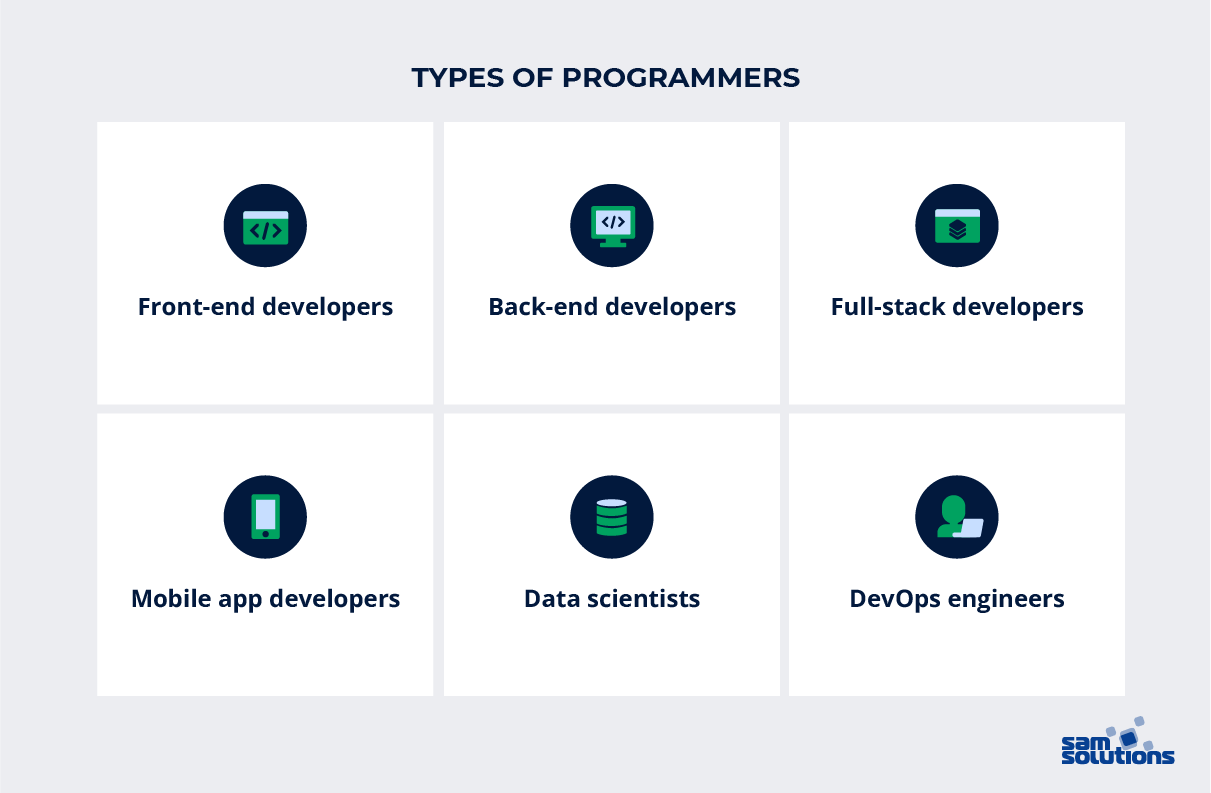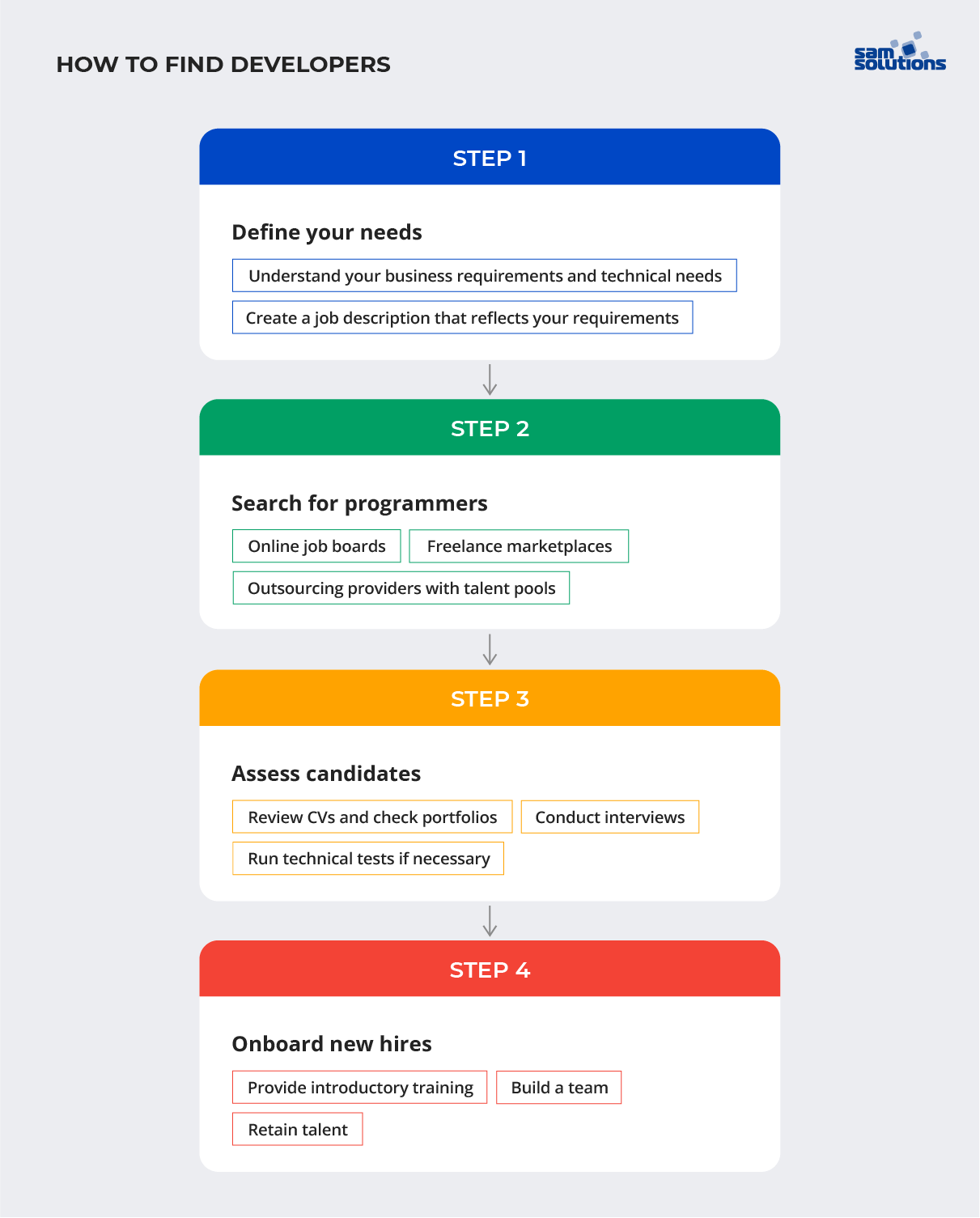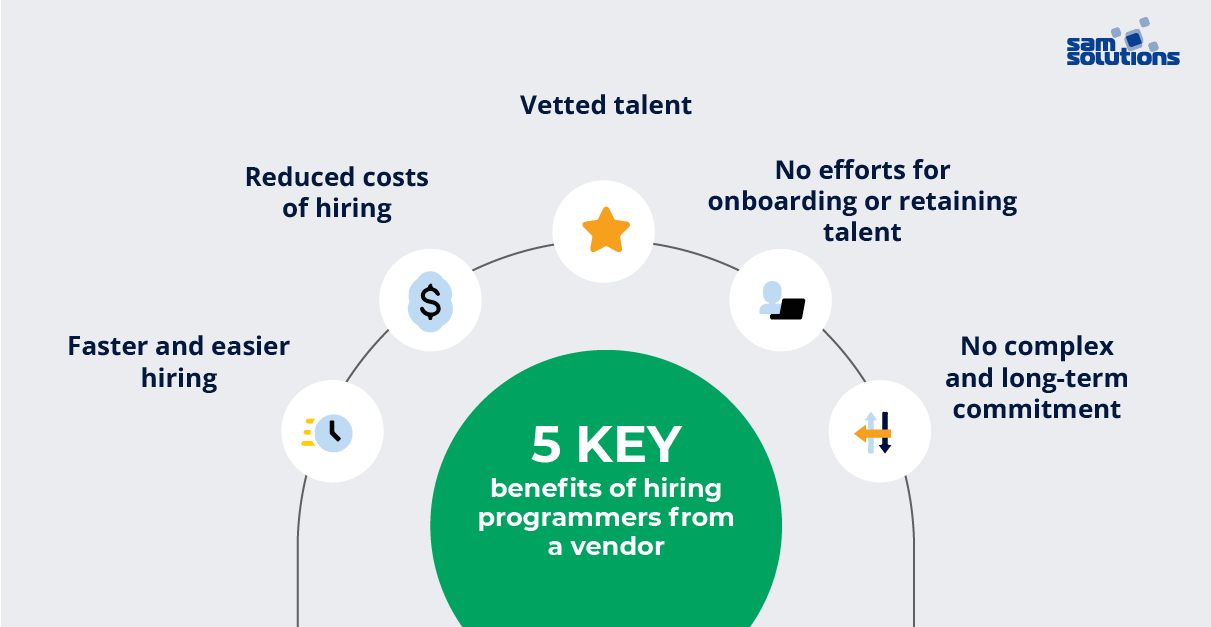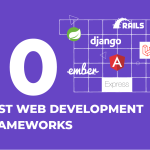The success of your project, adherence to the project schedule, as well as the number and severity of development challenges – all rely on the skills and experience of software specialists. That’s why finding the right programmers is essential for achieving your strategic business goals. In this article, we will outline the key steps you should follow to attract and secure quality talent for your project.
Leverage SaM Solutions’ decades-long expertise in IT to develop high-quality custom software for your business.
Types of Programmers
Understanding the different types of programming experts can help you make informed decisions when assembling your development team and ensure that you have the right talent for your project. To make the first step toward hiring good programmers, let’s discover the various roles and specialties that contribute to successful software development.
Front-end developers
Front-end developers are responsible for the look and feel of websites and apps. They use programming languages such as HTML, CSS, and JavaScript to create user-friendly and visually appealing interfaces. They work in close collaboration with designers and front-end developers to ensure seamless and enjoyable UX for customers.
Back-end developers
Back-end developers focus on the server-side of websites and applications. These specialists create the logic and functionality that powers the UI created by front-end software engineers. Using programming languages such as Java, PHP, .NET, and C#, they build servers, databases, and APIs.
Full-stack developers
Full-stack developers are proficient in both front-end and back-end technologies. They can handle the entire app development process, from start to finish. Their comprehensive understanding of the development process makes full-stack developers valuable assets, as they possess versatility and proficiency in multiple areas.

Mobile app developers
Mobile app developers specialize in building apps for different mobile devices such as smartphones and tablets. They use programming languages like Java, Kotlin (for Android), Swift, and Objective-C (for iOS). Working closely with designers, mobile app developers optimize the app’s UX for mobile devices.
Data scientists
Data scientists analyze large sets of data to identify patterns and trends. These specialists use programming languages such as Python and R to build complex models and algorithms. Data scientists play a crucial role in the finance, healthcare, and technology industries, helping companies predict outcomes and make informed decisions.
DevOps engineers
DevOps engineers bridge the gap between development and operations. They automate and streamline the software development process, ensuring reliable and efficient deployment and maintenance of applications. DevOps engineers use tools such as Docker and Kubernetes to improve stability and scalability and enable organizations to deliver high-quality software at a faster pace.
SaM Solutions has all these talents in its pool of vetted resources! Feel free to contact us – and hire first-rate programmers for your project.

How to Find Developers
Step 1. Define Your Needs
- Understand your business requirements and technical needs
In order to understand your business requirements, you need to identify the key objectives of the project. You may want to hire developers for the development of an entirely new software app or the maintenance of an existing one. The type of your software matters a lot, too. It’s important to be transparent about your goals so that you can articulate your objectives to the potential candidates.
Next, define your technical needs: list certain skills and expertise your project requires. For example, you may need developers who are proficient in specific programming languages or frameworks.
- Create a job description that reflects your requirements
After you’ve identified your business and technical requirements, you need to create a job description that reflects them. A good job description should be clear, concise, and informative, listing the required skills and experience for the position you are hiring for. You may mention a salary range or leave this topic for further discussion during the in-person interview.
Don’t forget to provide a company description too. Let candidates learn your mission and corporate values, see your accomplishments and understand business goals. Name the benefits you have, such as flexible working hours, the possibility to work from home, corporate training, and opportunities for career growth.
Step 2. Search for Programmers
After specifying your needs and creating a job description, it’s time for an active search phase. Further, we’ll discuss three different sources where to find programmers: online job boards, freelance marketplaces, and talent pools.
- Online job boards
Online job boards allow companies to post available job positions and receive applications from candidates. Examples of job boards are such websites as Indeed, Monster, and LinkedIn.
The advantage of using online job boards is that they have a rich pool of potential candidates, so you are more likely to find candidates with the specific skill set and experience you’re looking for. Besides, many job boards allow you to filter applications based on definite characteristics, including education level, years of experience, skill set, preferred salary, and location.
- Freelance marketplaces
Another option for finding software specialists is freelance marketplaces. Examples of such platforms are Upwork, Fiverr, and Freelancer. They allow companies to post job positions and receive proposals from available freelancers.
The advantage of freelance marketplaces is a large pool of freelancers with a wide range of skills and expertise. You can often find specialists with unique skill sets there. Additionally, freelancers are more flexible than full-time employees, which means you can hire them on a project-by-project basis and only pay for the work that’s completed.
- Outsourcing providers with talent pools
Outsourcing providers with talent pools are another option for finding good programmers. Such providers – SaM Solutions included – have a pool of developers that you can hire for your projects.
The advantage of using outsourcing providers with talent pools is that they have already vetted the candidates for you. Therefore, you can be sure that the candidates you hire are highly skilled and experienced. Outsourcing providers can also offer project management services, which can help ensure that your project runs smoothly.
In IT since 1993, SaM Solutions offers professional custom software development services to clients across all industries.
Step 3. Assess Candidates
- Review CVs and check portfolios/references
The first step in assessing candidates is to analyze their CVs, portfolios and references. This research will enlighten you on their experience and skills, and help you decide whether they are a good fit for the project. It is also important to verify the credibility of their references.
- Conduct interviews
After shortlisting the candidates, carry out in-person or online interviews. Talking to potential employees will give you a chance to ask questions about their experience, skills, and work style, as well as evaluate their soft skills (communication and empathy).
It is essential to have an interview plan and logically structure the discussion so that you wouldn’t forget to clarify any relevant details. Provide an opportunity for candidates to ask questions about your company and position as well, so that there would be no misunderstanding regarding their responsibilities and cultural fit later on.
- Run technical tests if necessary
Oftentimes, you may decide to run technical tests to assess the candidate’s hard skills and get tangible proof of their expertise in the field. You can conduct tech tests online or in person and make it a take-home assignment or a real-time exam, where a candidate is solving the problems right in front of you. Whichever testing method you choose, it will help you examine the candidate’s proficiency in software engineering, architecture, data analysis, or other specialized positions.
Step 4. Onboard New Hires
- Provide introductory training
Once you have selected the right candidate, it is important to provide them with a smooth onboarding process. The introductory training will help them in getting acquainted with the organization’s policies, procedures, and corporate culture. The training will also make them feel more comfortable in their new role and guarantee that they are well aware of their responsibilities.
- Build a team
The next step is to build a team around the new hires, creating a structured environment where each specialist could thrive and contribute to the success of the organization. This can be achieved by assigning an experienced mentor or a team lead who can guide the employees on the job and provide them with support and feedback. Fostering a culture of teamwork and collaboration can help integrate new hires and motivate them to contribute to the organization’s success.
- Retain top talent
Finally, you should make efforts to retain your talent by creating a positive work environment and providing opportunities for professional and personal growth. This can include:
- offering training programs
- providing regular feedback and performance assessment sessions
- ensuring that the company’s practices are fair and transparent
Investing in your employees can help establish a culture of excellence, leading to the attraction and retention of talent in the long run.

Faster and easier hiring
One of the main benefits is that the hiring process is faster than recruiting and hiring in-house. A vendor has an existing pool of skilled programmers, and they can quickly find candidates who meet your specific requirements. Regardless of your company size — be it a startup, medium or large business — a vendor gets you covered. This simplifies the recruitment and hiring process, saves both your time and effort, and allows you to focus on other critical aspects of your business.
Reduced costs of hiring
Hiring programmers from a vendor is a great idea, as it significantly cuts expenses. When you hire in-house, you need to take care of salaries, employee benefits, and other expenditures, such as payroll taxes, health insurance, and retirement plans. Instead, when you hire from a vendor, you only need to cover the services you receive, and the vendor is responsible for the rest. As a result, this reduces your expenses and allows you to allocate resources more efficiently.
Vetted talent
When you hire programmers from a vendor, you access the pool of vetted, high-quality talent. Vendors have rigorous hiring processes and select only the best specialists who have the proven expertise necessary to meet the client’s needs. You don’t need to worry about the quality of the work delivered, as you can trust that the programmers you hire are true experts in their field.
No efforts for onboarding or retaining talent
One more benefit of hiring programmers from a vendor is that you don’t need to worry about onboarding or retaining talent. Vendors take care of all the administrative tasks involved in hiring and supporting their employees, including onboarding, training, upskilling and retaining. This will free your time and resources and allow you to focus on your core business strategy.
No complex and long-term commitment
Hiring software engineers from a vendor also provides high flexibility and scalability. When you hire in-house, you have to commit to a long-term employment contract, which can be difficult to terminate if you no longer need their services. However, when you hire programmers from a vendor, you can hire them for as long as you need, and then terminate the contract when you no longer need their skills. This flexibility allows you to scale up or down your operations as needed, without any long-term commitments or complex legal obligations.
Hire Programmers from SaM Solutions
For more than 30 years, we have been delivering top-notch tech solutions for clients in the USA and Western Europe. We have an abundant talent pool of experienced programmers with deep expertise across a variety of business domains.
When you choose SaM Solutions, you get high-profile specialists who develop cutting-edge software based on your individual requirements. We offer flexible payment options, provide ongoing support, and guarantee transparent communication throughout the entire project.
The core values of our company are honesty, professionalism, and close collaboration with our clients. These values help ensure the best quality of the end software solution or product.
Conclusion
Looking for programmers for your project can be an overwhelming task. However, we hope that our guide on how to find a programmer has helped you understand the necessary steps. By following the tips we provided in this article, you can easily find the proper specialists for your endeavor.
If you need help from an outsourcing vendor, SaM Solutions would be glad to provide first-class software specialists according to your specific needs. Feel free to reach out to our team and share your project details with us.



























 5 Reasons Why Your Business Needs a Mobile eCommerce Application
5 Reasons Why Your Business Needs a Mobile eCommerce Application Using Salesforce to Improve Your Sales Pipeline: Five Tips
Using Salesforce to Improve Your Sales Pipeline: Five Tips Cross-Platform Mobile Development: Five Best Frameworks
Cross-Platform Mobile Development: Five Best Frameworks How to Develop Custom Accounting Software
How to Develop Custom Accounting Software 10 Best Web Development Frameworks in 2024
10 Best Web Development Frameworks in 2024












 Why React and Node.js Are the Top Technologies for Creating High-Performance Web Apps in 2024
Why React and Node.js Are the Top Technologies for Creating High-Performance Web Apps in 2024 10 Best IoT Platforms for 2024
10 Best IoT Platforms for 2024 Top 20 Latest Trends in the Ecommerce Industry in 2024
Top 20 Latest Trends in the Ecommerce Industry in 2024 Top 10 Most Popular Programming Languages in 2024
Top 10 Most Popular Programming Languages in 2024